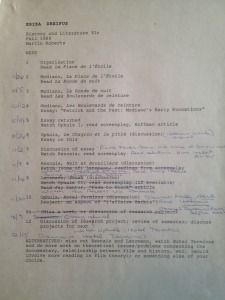Friday Finds for Writers: Modianomania
Change in plans! Instead of a typical “Friday Finds” post, I’m going to share with you some of my favorite finds about the latest Nobel Prize winner in literature, Patrick Modiano.
A preface:
Monsieur Modiano’s work and I go back 25 years. As I commented on Twitter and Facebook yesterday, I discovered Modiano’s writing during my junior fall in college, in an independent study on literature and film relating to the World War II period in France.

Suffice to say that as I continued my studies–eventually, I earned a PhD in French history, focusing on the World War II period–I kept up with Modiano’s work. Studying French history meant that I had the great good fortune to make repeated trips to France, and my Modiano collection expanded.
It has been more than a decade since I’ve taught French history or literature, and a lot of other things have changed, too. I haven’t kept up as assiduously with Modiano’s books in recent times, though I had caught news of his latest work.
And then yesterday came. I’ve been enjoying all kinds of memories of reading Modiano and the pleasures of talking about his work with my teachers, students, and others I’ve encountered over the years. (As I drafted this post I recalled the student who reported in his end-of-semester evaluation that Modiano’s Voyage de noces, translated as Honeymoon, which my co-instructor and I had assigned, was the best book he’d read [that semester? that year? ever? I no longer recall].)
But I know that Modiano is very new to a lot of people. So here are some of the English-language links that I ran across yesterday that I think may help you get to know and admire Monsieur Modiano as much as I do.
Bon week-end, mes amis!
Thanks for the recommendations, Erika. He sounds fascinating.
John
He is!
Thanks Erika for the cheers. I’ve been a bit disheartened by the “obscure” attached to his names by several literary journalists in this country, even some I respect. Difficult to consider as “obscure” somebody who has enjoyed such long success with readers and published some thirty books. But of course, it poses again and again the question of translation in the US, and accessorily of the monolingualism of most…
I’ve rejoiced at this nomination, not because of his frenchness (hum, it’s not a word?) but because he is a “grand monsieur” in literature and life… And as you, I go back far – about 30 years now…
Beatrice, I understand. Obviously, no one would call him “obscure” in France.
I am struggling mightily not to over-indulge on Amazon.fr….